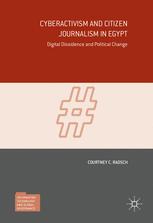

Most ebook files are in PDF format, so you can easily read them using various software such as Foxit Reader or directly on the Google Chrome browser.
Some ebook files are released by publishers in other formats such as .awz, .mobi, .epub, .fb2, etc. You may need to install specific software to read these formats on mobile/PC, such as Calibre.
Please read the tutorial at this link: https://ebookbell.com/faq
We offer FREE conversion to the popular formats you request; however, this may take some time. Therefore, right after payment, please email us, and we will try to provide the service as quickly as possible.
For some exceptional file formats or broken links (if any), please refrain from opening any disputes. Instead, email us first, and we will try to assist within a maximum of 6 hours.
EbookBell Team

0.0
0 reviewsThis compelling book explores how Egyptian bloggers used citizen journalism and cyberactivism to chip away at the state’s monopoly on information and recalibrate the power dynamics between an authoritarian regime and its citizens. When the Arab uprisings broke out in early 2011 and ousted entrenched leaders across the region, social media and the Internet were widely credited with playing a role, particularly when the Egyptian government shut down the Internet and mobile phone networks in an attempt to stave off the unrest there. But what these reports missed were the years of grassroots organizing, digital activism, and political awareness-raising that laid the groundwork for this revolutionary change. Radsch argues that Egyptian bloggers created new social movements using blogging and social media, often at significant personal risk, so that less than a decade after the information revolution came to Egypt they successfully mobilized the overthrow of the state and its president.